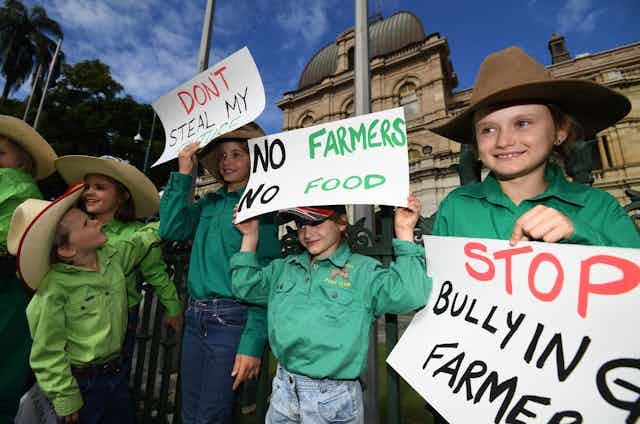The Queensland government passed legislation last month to prevent the clearing of high-value regrowth vegetation on freehold and Indigenous land. The move has been deeply unpopular with many landholders. They have argued that they are footing the bill for the commmunity’s environmental aspirations – without compensation.
The government’s intention was to reinstate a “responsible vegetation management framework”, broadly in line with legislation first passed in 2004, but which the Newman government repealed in 2013.
Read more: Queensland's new land clearing bill will help turn the tide, despite its flaws
But time has moved on since 2004. Instead of relying on a heavy-handed regulatory approach, a mix of carrots and sticks might have generated economic value for landholders, and reduced land clearing into the bargain.
Why landholders are fuming
Broadly speaking, landholders are worried the government hasn’t listened to their concerns and won’t pay for the land that is now effectively under state regulatory control. The parliamentary committee set up to report on the bill received more than 13,000 submissions (including 777 non-pro-forma submissions) – the largest number received by any committee of the Queensland parliament.
Read more: Australia is a global top-ten deforester – and Queensland is leading the way
The government itself has admitted stakeholders were not consulted in the preparation of the bill, although the department report cites a “substantial history” of consultation on many of its measures. Nevertheless, the Queensland Law Society felt that further consultation would have been appropriate given “the sensitive nature of this legislation”.
Many submissions raised concerns about information shortfalls, regulatory duplication and excessive red tape. The department’s fallback position was simply to argue that “the proposed amendments are consistent with the government’s 2017 election commitment”.
Ironically, it is not only landholders who have lost out financially. The Queensland government is now effectively in control of an additional 1.76 million hectares of land, which it intends to leave undeveloped. But, in today’s world, the carbon stored in this land has a market price as well as an environmental value, if it’s properly managed.
Better alternatives
With a little more preparation and creative thinking, the government might have been able to spare our vegetation, create a huge pool of lucrative carbon offsets ready to market to the world, and provide compensation to affected landholders.
For instance, instead of an outright prohibition on land clearing, the government could have put in place a three-year moratorium on land clearing. Landholders could then be given a chance to opt out of the moratorium by transferring their land to a permanent conservation covenant or similar arrangement.
Although some careful drafting would be required to ensure the offsets integrity standards and other regulatory requirements are met, landholders who opted out of the temporary moratorium could become eligible to earn carbon offsets, or any other available financial incentives.
Read more: Can carbon farming change the face of rural Australia?
On the other hand, landholders who do not respond to this financial “carrot” would run the risk of being hit with the (uncompensated) “stick” of a more prescriptive approach (temporary or not) at the end of the moratorium period.
The government could help this transition along by helping landholders sign up for one or more of the various existing schemes for conservation covenants, carbon offsets and biodiversity offsets. One of the main factors preventing greater participation in these schemes is prohibitively high transaction costs, especially in the early stages.
I realise there is a degree of wishful thinking about this proposal. Several hurdles, particularly political ones, would need to be overcome. But if we want serious, fair and enduring land use reform, I think these options merit a more meaningful investigation.
At the moment, a heavy-handed sweep of a pen by politicians in Brisbane has locked both landholders and government out of the market for ecosystem services. Given that the government now essentially owns a huge store of carbon assets, it’s a missed opportunity.
Read more: Australia’s biggest emitters opt to 'wait and see' over Emissions Reduction Fund
With a little more creative thinking, Queensland might have provided compensation to landholders at no cost to itself. Instead, it has used a regulatory hammer to impose rules that – judging by past performance – have no guarantee of surviving past the next election.

